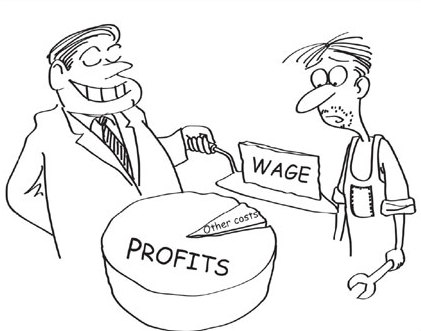Fair minimum wage essential for stronger US economy
 0 Comment(s)
0 Comment(s) Print
Print E-mail Shanghai Daily, July 13, 2012
E-mail Shanghai Daily, July 13, 2012
|
|
|
[By Zhou Tao/Shanghai Daily] |
June marked the 100 year anniversary of the first minimum wage law passed in the United States. And, while there is nothing new about low-wage work, we should take this occasion to recognize an even more dispiriting fact about the low-wage workforce: It could have been a thing of the past.
The first minimum wage law in the United States was established on June 4, 1912, in Massachusetts. More than a dozen states would follow over the next 10 years, and in 1933 the new US Secretary of Labor, Frances Perkins, wrote an essay to make the case for a federal minimum wage.
Reading Perkins' essay today reminds us of the potential that minimum wage laws hold for shaping a fair and productive economy. At the time of her writing, the nation was in the midst of the Great Depression, and Perkins feared the destructive potential of the growing number of "fly-by-night" sweatshop operators attempting to gain an unfair advantage over their competitors by selling cheaper products made possible by rock-bottom labor costs.
These low-wage sweatshop operators were, in other words, cheaters. They offered cheaper products by taking advantage of workers who, in a period of record unemployment, had no choice but to accept whatever job they could get - in some cases, earning only 3.5 US cents per hour (back then).The purpose of a minimum wage law was not only to protect workers from abuse by their employers, but to also ensure fair competition by requiring that all businesses play by the same rules.
The first federal minimum wage law was established in 1938, five years after Perkins' article appeared. Yet, after several decades of Congressional stewardship maintaining a strong minimum wage, the real value of the minimum wage was allowed to plummet over the last four decades.
As a result, the minimum wage peaked in 1968, and has since trailed behind the rising cost of living. In fact, the minimum wage would be well over US$10 today if it had simply kept pace with inflation. Instead, it's only US$7.25 an hour - or just over US$15,000 a year.
The problems associated with low wages are no longer just an emerging threat, as Perkins once feared, but have instead come to define a significant share of the labor market. These problems will persist. Low-wage industries are now among the economy's fastest-growing sectors, and some of the lowest paid occupations are expected to create the largest numbers of new jobs over the next several years.
For many employers, low wages are part and parcel of a robust growth strategy. As of last year, no fewer than 35 of the nation's 50 largest low-wage businesses had posted profits that exceeded their pre-recession levels.
Meanwhile, the vast majority of businesses in the US have yet to recover from the recession, particularly small businesses. A Gallup poll from earlier this year revealed that fully 85 percent of small businesses still have no intention of hiring or expanding their business because demand remains so weak.
We are now three years out from the official end of the recession, and workers' wages are actually declining rather than rebounding. From March 2011 to March 2012, real average hourly earnings fell 0.6 percent for all private sector workers and declined by a full 1 percent for non-supervisory and production workers.
Perhaps the saddest fact is that the low-wage workforce has become an all-too-familiar fixture of the American economy. If Perkins were alive today, she would only need one look at our outdated minimum wage law to know that our economy has become an anti-competitive environment where low-road employers can thrive at the expense of both other employers and workers.
Now, 100 years after the first minimum wage law was passed, low-wage industries once again threaten to impoverish America's workforce and derail the entrepreneurial ambitions of small business owners. And the American people have noticed. According to a recent poll, more than two-thirds of Americans support raising the minimum wage to over US$10 per hour. This support is behind a proposal by Senator Harkin, an Indiana Democratic, that would raise the minimum wage to US$9.80 an hour, significantly raise the minimum wage for tipped workers (currently at US$2.13 an hour), and provide for annual cost of living adjustments for both.
There was nothing inevitable about the low-wage economy that we find in the US today. What decades of experience tell us, however, is that unless we seriously acknowledge our responsibility to maintain the value of the minimum wage, we have little reason to expect anything different in the century ahead.
Christine Owens is executive director of the National Employment Law Project. Copyright: American Forum






